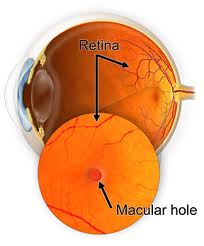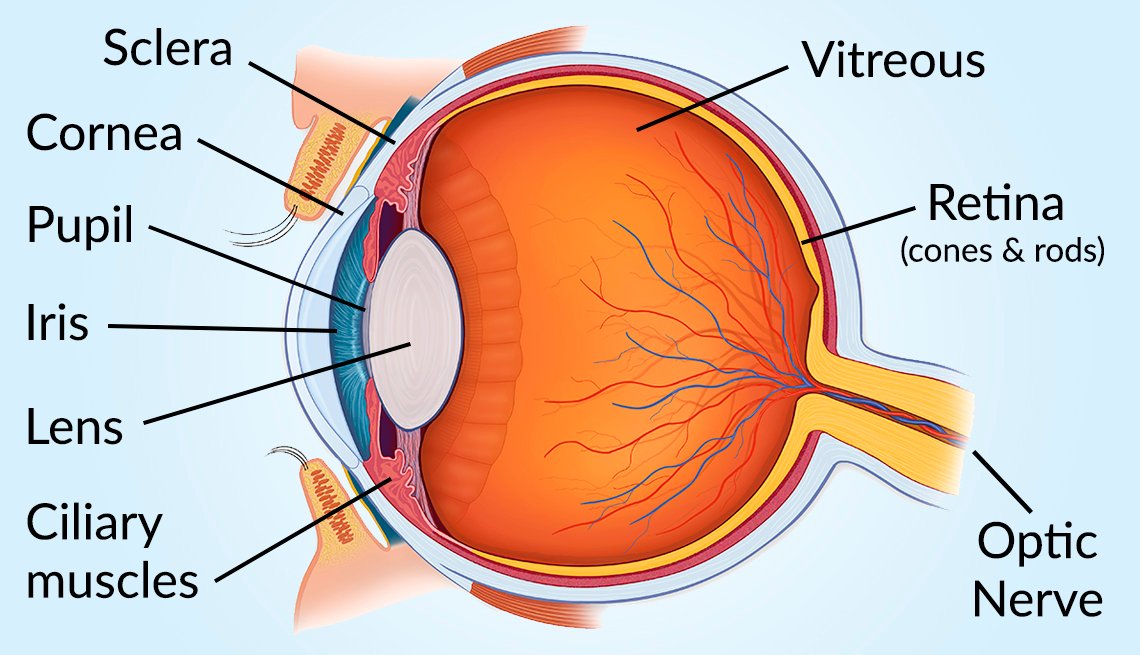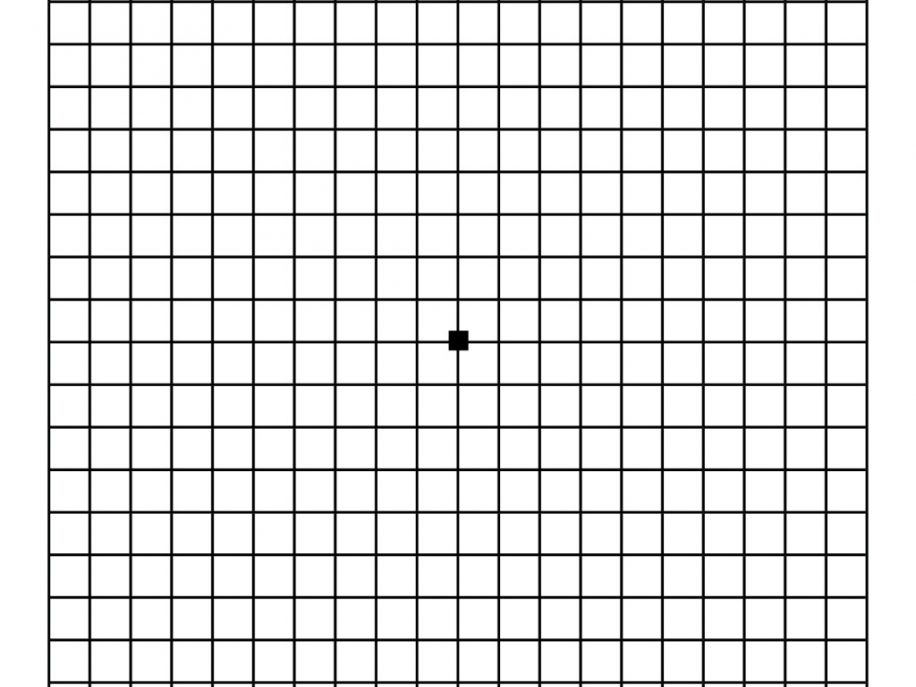
Top 5 Most Common Retina Issues
Most Common Injuries and Diseases of the Retina
**Whatever the cause may be, you need to seek professional help at the first signs of any of these issues and diseases**
1) Macular Degeneration
Macular Degeneration is the thinning of the macula which causes central vision loss. It is a common eye condition for individuals over 50. Since the macula is responsible for your central vision, macular degeneration will cause blurry central vision and sometimes even a blind spot in the center of your field of vision. You can develop either wet macular degeneration or dry macular degeneration. In many cases, macular degeneration begins as the dry form and develops into the wet form over time. Left untreated, Macular Degeneration leads to blindness.
2) Diabetic Retinopathy
Much like how it sounds, Diabetic Retinopathy stems from complications of diabetes. In fact, according to the National Eye Institute, over time more than half of people with diabetes will develop diabetic retinopathy. According to a study posted by The American Academy of Ophthalmology (https://www.aao.org), children with diabetes have a higher risk of developing Diabetic Retinopathy when the child has Type 2 Diabetes than those with Type 1. It is important to seek medical attention to monitor your eye health even in early stages of diabetes. For resources on living with diabetes, visit The American Diabetes Association at https://diabetes.org/.
Diabetic Retinopathy is caused by the blood vessels, called capillaries, in the back of your eye deteriorating over time and causing fluids to leak under and even into the retina. The accumulation of fluid causes your retina to swell. You may develop more capillaries which could be abnormal and actually break and bleed. Your vision will worsen, get distorted or appear blurry.
3) Retinal Tear
A retinal tear is when the vitreous, the gel-like substance in the center of your eye, begins to shrink. This causes pulling or tugging on your retina, which is the thin layer of tissue that lines the back of your eye. The retina tears when its tissue breaks under enough pressure from the shrinking vitreous. This event can cause a sudden onset of symptoms including floaters and flashing lights.
4) Retinal Detachment
A retinal detachment can follow an undiagnosed retinal tear. The retinal detachment is defined by the presence of fluid under or behind the retina. The opening from a retinal tear can allow fluid to pass through and accumulate behind the retina. As the fluid fills the area, it lifts the retina away from your underlying tissue layers.
Retinal detachments are often progressive, meaning they will get worse over time if not treated. The treatments can include surgery or injections into the eye.
5) Macular Hole
Your macula is located at the back of your retina and is responsible for your central vision. A macular hole is a defect in the macula. It can be caused by an eye injury or it can be the result of abnormal traction between your vitreous and your retina.


The Importance of Retina Health
When asked which sense would be the hardest to lose, 8 out of 10 people (84%) answered: their vision. We process so much information through our site alone. They say a picture is worth a thousand words so it’s not surprising that most people would feel at a complete loss without it. But just like anything else in your life, you have to take care of your vision and pay attention to your eye health. Visiting an Optometrist annually should be part of your health routine, just the same as visiting your medical doctor is. Your Optometrist will check your retina for any issues while you are there.
Ironically, only about 4 out of 10 people see an eye doctor annually. Among the detection of high blood pressure, diabetes and determining your prescription, your eye doctor will also recognize symptoms of retinal injuries or diseases. If any retina issues are detected during your regular exam, you will receive a referral to see a Retina Specialist, like Dr. Malkani at Malkani Retina Center. Only a certified Retina Specialist can determine the specific issue you are experiencing, treat it (sometimes on an ongoing basis), and continue to monitor your progress throughout your aging process.
Although the retina is just a small area in your eye when compared to the rest of your body, it is responsible for receiving the light sent through your lens, converting the focused light into neural signals and sending them off to the brain to be translated into recognizable patterns. Put simply, your retina processes an image from focused light, and the brain is left to decide what exactly that image is.
Risk Factors of Retina Diseases or Injuries
Retinal issues can occur due to age, diabetic status and even injury sustained by your eye. There are certain risk factors to know about. Patients are at higher risk of acquiring a retina disease or injury when they:
- Smoke
- Are obese
- Have Diabetes or other diseases
- Age (most common after age 50)
- Have a family history of retinal disease
- Experience eye injury
Diagnosing your Retina Problems
In the case of a retinal injury, it’s difficult if not impossible to self-diagnose. The hardest part in determining your particular retina problem is that they present most of the same symptoms. Only a doctor can determine the specific issue you are experiencing and its prognosis. Setting an appointment with a Retina specialist is always the best course of action.
The signs of a retinal issue usually present as:
- Floaters, which are floating specs or what looks like cobwebs in your vision
- Blurred or distorted vision (straight lines can look wavy)
- Distorted side vision
- Actual full or partial loss of vision
Treatment Options from your Retina Doctor commonly include:
Surgery
- Lasers
- Freezing (cryopexy)
- Shrinking abnormal blood vessels
- Injections
- Air or gas (pneumatic retinopexy)
- Medicine
- Indenting the surface of your eye (scleral)
- Implanting retinal prosthesis
- Removing and Replacing the fluid in the eye (vitrectomy)
What can I do if I think I have an issue?
You need to schedule an appointment at the first sign of an issue so you can prevent further damage. We are happy to schedule your appointment for you at http://mrcmdcom.netfirms.com/mrcmd/request-an-appointment/ or call us at (239) 324-4888. Our staff will walk you through the entire process.
We have three locations to choose from: Fort Myers, Naples, and Port Charlotte.
Want a quick vision test? Try this!
Use the Amsler Grid below to test your vision. You can pick up a pocket sized Amsler Grid magnet to keep on your fridge or in a convenient location on your next visit to Malkani Retina Center.
Amsler Test Instructions:
1) Hold card approximately 12" from eye.
2) Test right eye first, by covering left eye.
3) Concentrate on center dot.
4) Then repeat with left eye by covering the right.
** If you notice any waves, distortions, or blind spots in the lines, inform
your retina specialist as soon as possible **
